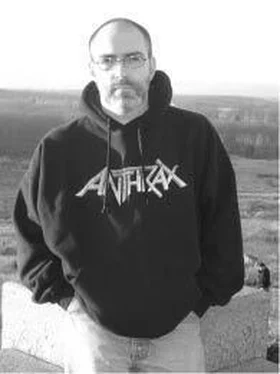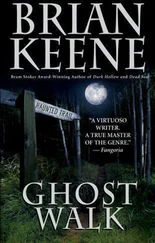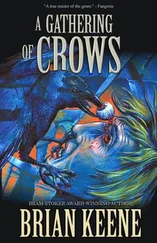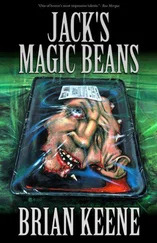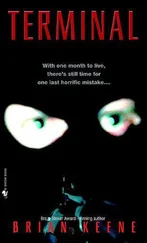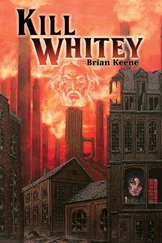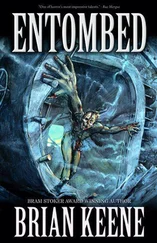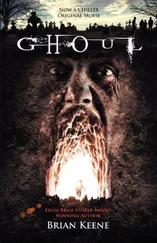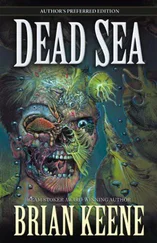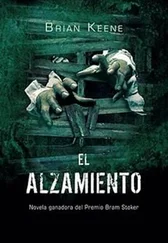

Acknowledgements
For this new edition of Tequila’s Sunrise , my thanks to everyone at Deadite Press; Alex McVey; Dallas Mayr (whose The Transformed Mouse inspired this tale); Tod Clark, Kelli Owen, Mark Sylva, and John Urbancik (who proofread the original version); Geoff Cooper; Mike Oliveri; Mikey Huyck; J. F. Gonzalez; Mary SanGiovanni; and my sons.
OTHER DEADITE PRESS BOOKS BY BRIAN KEENE
Urban Gothic
Jack’s Magic Beans
Clickers II (with J.F. Gonzalez)
Take The Long Way Home
A Gathering of Crows
Darkness on the Edge of Town
For Dave Thomas: “ Para todo mal, mescal. Para todo bien, también.” (For all hardships, mezcal. For all wellness, as well.)
CONTENTS
Tequila’s Sunrise
Burying Betsy
Dust
Fade to Null
Bunnies in August
That Which Lingers
Two-Headed Alien Love Child
Golden Boy
TEQUILA’S SUNRISE
(A FABLE)
Tequila has no history; there are no anecdotes confirming its birth. This is how it’s been since the beginning of time, for tequila is a gift from the gods and they don’t tend to offer fables when bestowing favors. That is the job of mortals, the children of panic and tradition.
—Alvaro Mutis
Where shall I go?
Where shall I go?
The road of the god of duality.
Is your house in the place of the fleshless?
Perchance inside heaven?
Or here on earth only?
—Traditional Aztec funeral chant
To open doors, one must first know how to find them.
—Daemonolateria
Once upon a time, which is how most fables begin, there was a land known as Oaxaca. The people who lived in Oaxaca called themselves the Tenochas, but history would call them the Aztecs. Oaxaca was a deadly place, a country full of extremes—in its people, creatures, and the landscape itself. Although it offered much beauty and wonder, there were myriad dangers lurking there, as well.
Atop one of Oaxaca’s snow-covered, treeless mountains, a thousand feet above the sea and overlooking a wide, fertile valley, sat the city of Monte Alban. It was a large city (though not the biggest) and many people lived there. In the morning, the sun glinted off the frescoed temples and buildings in its plaza. At night, the moon reflected on its ceremonial pools.
Before the Spaniards arrived in Oaxaca, a young boy named Chalco could often be found on Monte Alban’s expansive ball courts playing tlachtli and patolli with his friends. But when Cortes’s army landed on their shores, Lord Moctezuma issued a war summons. The invaders’ intentions were unclear. They said they came in peace, but they brought a new god and drove the people of Oaxaca before them like cattle.
Most of the able-bodied men in Monte Alban answered Moctezuma’s call to arms, and traveled to the capital city of Tenochtitlan. Chalco and the other boys had to assume their place and were now responsible for farming, hunting, and all the other tasks. There was no more time for play or fun—only for the everyday drudgery of life. Childhood ended early and there was no time to miss it or weep for its passing. There were no more games and no more play, and the ball courts sat empty and silent, their stones dusty.
Some people said it was the end of the world.
Perhaps they were right.
***
The day Chalco met the worm began like any other.
It began in darkness.
***
Before dawn, the call to rise echoed across the city, as it did every day. Inside the pyramid temples, the priests blew conch shell trumpets while their acolytes beat on wooden drums. The noise disturbed the birds roosting on the temple peaks. Shrieking, they flew into the sky, adding to the cacophony. The music throbbed through the streets and alleys, waking the residents.
Chalco stared up at the thatched roof of his family’s adobe hut and rubbed sleep dust from the corners of his eyes. He was still tired. After working in the fields all day long, he’d gone to bed late the night before. Today would offer a welcome change. He planned on going hunting. His clan’s larder grew empty.
The drumming continued and the trumpets sounded again. Around him, Chalco’s mother, sisters, and younger brother stirred. The adobe had two rooms, partitioned down the middle. On one side were the sleeping quarters. The other side held the kitchen and dining area. As Chalco stumbled out of bed, his mother tended to the fire, which they’d banked the night before. Kneeling, she blew it back to life. Was it his imagination or did she look older today than she had in recent months? Her once black hair was now streaked with white. She didn’t smile very much anymore, and there were lines on her face. He knew that she missed his father. Chalco missed him, too. He wondered if they’d see him again.
Outside, the trumpets sounded one more time—wailing long and mournfully before they faded. Somewhere, in a nearby hut, a baby cried.
Yawning, Chalco got dressed. He passed his otterskin maxtli between his legs, and then cinched it around his waist. The two ends of the loincloth hanging down in the front and back were embellished with intricate designs of an eagle and a jaguar—the totems of his clan. He pulled a mantle of woven cloth over his left shoulder, and then slipped into his deerskin sandals. His feet had gotten bigger, and his toes felt cramped inside them. Soon, it would be time for a new pair. At five feet five inches, Chalco was considered tall for his people. His father often joked that perhaps he was really the son of the cannibal giants rumored to live in the Northern caves. But he also said that Chalco’s size was a blessing, especially when it came to work. His broad head and thick neck were good for carrying baskets, and his long, muscular arms and wide feet aided him both in the field and on the hunt. Chalco did not mind his size. He knew it gave him an advantage over the other boys. The only thing he did not like was his coarse, dark hair. Currently, the thick bangs hung over his almond-shaped eyes and got in his way. He had to constantly flip his hair away from his face. Despite the annoyance, Chalco was reluctant to cut it. He wanted a long, braided ponytail like many of the older men had. He’d noticed that women seemed to fancy them.
The fire’s glow filled the hut. The warmth felt good. Dressed for the day, Chalco turned to his little brother. He was still in bed, blinking, half-awake.
“Quintox, get up.”
The younger boy shook his head. “I am still tired, Chalco.”
“Did you not rest well?” Chalco knew that Quintox missed their father and uncles, and wondered if it was affecting his sleep.
“I had a strange dream.”
Chalco sat on the edge of the bed and patted his head. “What was it?”
“I shouldn’t say.” Quintox frowned. “It might be wrong to tell.”
“Then whisper if you are ashamed, so that our sisters won’t hear.”
Quintox lowered his voice. His eyes were wide. His bottom lip trembled. “I dreamed that Cortes was really Quetzalcoatl.”
Chalco stiffened. He glanced around quickly, making sure the rest of the family hadn’t heard his brother’s blasphemy. Such talk could lead to only one thing—Quintox being sacrificed to Tlaloc, the rain god who required children several times a year as tribute. Although the priests also gathered children’s tears in a ceremonial bowl as an offering, that would not be Quintox’s fate. Not for blasphemy. He would shed blood rather than tears. To compare Quetzalcoatl, the Plumed Serpent, greatest of all the gods, to Cortes, the leader of the Spanish invaders, was unforgivable.
Читать дальше
